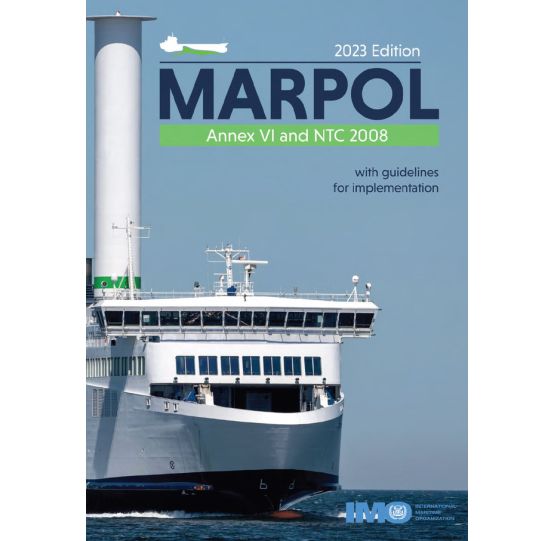MARPOL Annex VI and NTC 2008, 2023 edition
MARPOL Annex VI, Regulations for the prevention of air pollution from ships, covers the requirements in respect of both control of emissions of air pollutants from ships (chapter 3) and carbon intensity of international shipping (chapter 4). The requirements for control of nitrogen oxides (NOx) emissions, given by chapter 3, are supplemented by the mandatory NOx Technical Code 2008, which covers the testing, survey and certification of marine diesel engines.
This fifth edition of the consolidated texts of MARPOL Annex VI and the NOx Technical Code 2008 includes all amendments through to those adopted at MEPC 76 in June 2021, in particular those on the IMO short-term greenhouse gas (GHG) reduction measures (EEXI, CII and enhanced SEEMP).
Also contained are the current versions of the Guidelines and other information relevant to the application of MARPOL Annex VI and the NOx Technical Code 2008. These include all those related to:
- exhaust gas treatment systems and measures for reduction of NOx and SOx emissions from ships;
- improvement of energy efficiency to reduce GHG emissions from ships, related to chapter 4 of MARPOL Annex VI; and
- sulphur content of fuel oil used by ships.
This publication is intended to be of use to maritime administrations, recognized organizations, shipping companies, classification societies, educational institutes, shipbuilders and equipment manufacturers together with others with an interest in the prevention of air pollution from ships and in the technical and operational measures to improve the energy efficiency of ships.
IMO
As a specialised agency of the United Nations, IMO is the global standard-setting authority for the safety, security and environmental performance of international shipping. Its main role is to create a regulatory framework for the shipping industry that is fair and effective, universally adopted and universally implemented.
In other words, its role is to create a level playing-field so that ship operators cannot address their financial issues by simply cutting corners and compromising on safety, security and environmental performance. This approach also encourages innovation and efficiency.
Shipping is a truly international industry, and it can only operate effectively if the regulations and standards are themselves agreed, adopted and implemented on an international basis. And IMO is the forum at which this process takes place.


